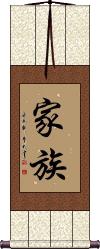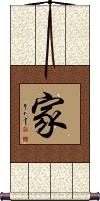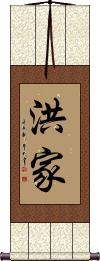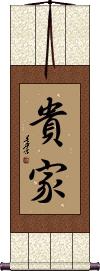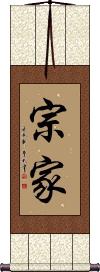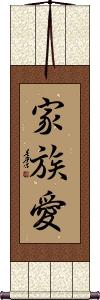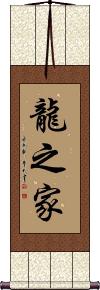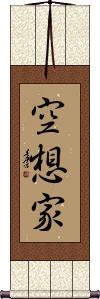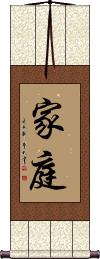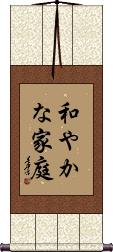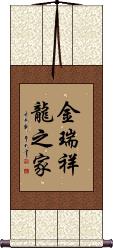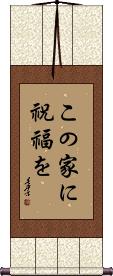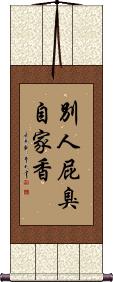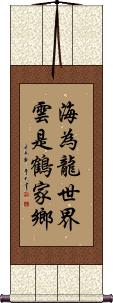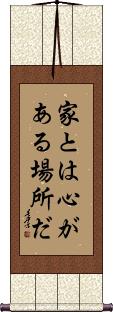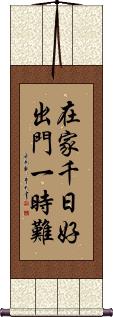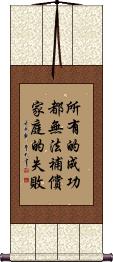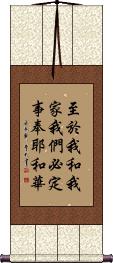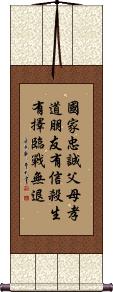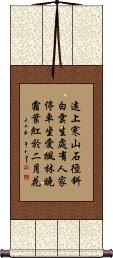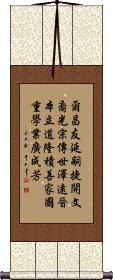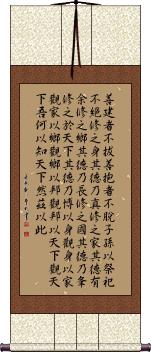Many custom options...
And formats...

家 in Chinese / Japanese...
Buy an 家 calligraphy wall scroll here!
Personalize your custom “家” project by clicking the button next to your favorite “家” title below...
1. Family / Members of a Family
3. Hung Gar
5. Soke / Shuke
6. Architect
7. Athlete
8. Budoka
9. Dancer
10. Dreamer
11. Family Love
14. Hung Ga Kuen
15. Karateka
16. Neijia Fist
20. Forever Family
21. Happy Family
22. Feel at Ease Anywhere / The World is My Home
24. Home is where the heart is
25. Safety and Well-Being of the Family
26. Lau Gar Kung Fu
28. Rise Up with Thrift and Diligence
30. Musician
31. Happy Family
32. Home of the Auspicious Golden Dragon
33. Bless this House
34. The farts of others stink, but one’s own smells sweet
35. Every Creature Has A Domain
36. Home is where the heart is
38. Joshua 24:15
39. Any success can not compensate for failure in the home
40. Joshua 24:15
42. Mountain Travels Poem by Dumu
Family / Members of a Family
家族 is family in Japanese Kanji, Chinese and Korean.
This represents all the members of a family.
This can also mean household or clan, depending on the context.
Family / Home
家 is the single character that means family in Chinese and Japanese.
It can also mean home or household depending on context.
Hanging this on your wall suggests that you put “family first.”
Pronunciation varies in Japanese depending on context. When pronounced “uchi” in Japanese, it means home, but when pronounced “ke,” it means family.
![]() Note that there is an alternate form of this character. It has an additional radical on the left side but no difference in meaning or pronunciation. The version shown above is the most universal, and is also ancient/traditional. The image shown to the right is only for reference.
Note that there is an alternate form of this character. It has an additional radical on the left side but no difference in meaning or pronunciation. The version shown above is the most universal, and is also ancient/traditional. The image shown to the right is only for reference.
Hung Gar
洪家 is the martial arts title Hung Ga or Hung Gar.
The first character means flood, big, immense, or great but it can also be the surname, Hong or Hung.
The last character means family or home.
This can also be read as “The Hung Family” or “The Hung Household.” This title is mostly associated with a style of Kung Fu.
Sasuga / Takaya
Soke / Shuke
宗家 is a Japanese word that means “head of the family” or “originator.”
In Chinese, this is an honor name for Shandao (善導), a writer of commentaries on the sutras of the Pure Land sect of Buddhism.
Architect
Athlete
運動家 means athlete, sportsman, or sporty person.
In certain contexts, it can mean activist, campaigner, or crusader.
Budoka
Martial Artist
Dancer
Modern Chinese Version
Dreamer
夢想家 means “dreamer” or “visionary” in Chinese, Japanese Kanji, and old Korean Hanja.
Family Love
家族愛 is a Japanese title that means love of (one's) family, family love, or familial love.
Heike Star / Betelgeuse
平家星 is the old Japanese title for the Betelgeuse star in the constellation Orion.
While also known as Alpha Orionis or Betelgeuse in the West, this was the “Heike star” in Japan.
The powerful Taira clan, known colloquially as the 平家 (Heike clan), adopted this star's red color as its symbol sometime in the late 800s AD. They called the star 平家星 (Heike-boshi).
Home of the Dragon
Added by special request of a customer. This phase is natural in Chinese, but it is not a common or ancient title.
The first character is dragon.
The second is a possessive modifier (like making “dragon” into “dragon's”).
The third character means home (but in some context can mean “family” - however, here, it would generally be understood as “home”).
Hung Ga Kuen
Karateka
Neijia Fist
Visionary / Dreamer
Family / Household
家庭/傢庭 is a common way to express family, household, or home in Chinese, Japanese Kanji, and old Korean Hanja.
However, for a wall scroll, we recommend the single-character form (which is just the first character of this two-character word). If you want that, just click here: Family Single-Character
The first character means “family” or “home.” The second means “courtyard” or “garden.” When combined, the meaning is a bit different, as it becomes “household” or “family.” The home and/or property traditionally has a strong relationship with family in Asia. Some Chinese, Korean, and Japanese families have lived in the same house for 7 or more generations!
Family Over Everything
Forever Family
永遠的家 is a special phrase that we composed for a “family by adoption” or “adoptive family.”
It's the dream of every orphan and foster child to be formally adopted and find their “forever family.”
The first two characters mean forever, eternal, eternity, perpetuity, immortality, and/or permanence. The third character connects this idea with the last character which means “family” and/or “home.”
Happy Family
和諧之家 means “harmonious family” or “happy family” in Chinese.
The first two characters relay the idea of happiness and harmony.
The third character is a connecting or possessive article (connects harmony/happiness to family).
The last character means family but can also mean home or household.
Feel at Ease Anywhere / The World is My Home
四海為家 literally reads, “Four Seas Serve-As [my/one's] Home.”
Together, 四海 which literally means “four seas” is understood to mean “the whole world” or “the seven seas.” It's presumed to be an ancient word from back when only four seas were known - so it equates to the modern English term, “seven seas.”
This can be translated or understood in a few different ways:
To regard the four corners of the world all as home.
To feel at home anywhere.
To roam about unconstrained.
To consider the entire country, or the world, to be one's own.
Home of the Black Dragon
黑龍之家 was added by special request of a customer. This phase is natural in Chinese, but it is not a common or ancient title.
The first character is black.
The second is dragon.
The third is a possessive modifier (like making “dragon” into “dragon's”).
The fourth character means home (but in some context can mean “family” - however, here it would generally be understood as “home”).
Home is where the heart is
家由心生 is an old Chinese proverb that is roughly equal to the English idiom “Home is where the heart is.”
If you know Chinese, you may recognize the first character as home and the third as the heart.
Safety and Well-Being of the Family
Kanai Anzen
家內安全 is the Japanese way of saying “Family First.”
It's a Japanese proverb about the safety and well-being of your family and/or peace and prosperity in the household.
Some Japanese will hang an amulet in their home with these Kanji. The purpose is to keep your family safe from harm.
According to Shinto followers, hanging this in your home is seen as an invocation to God to always keep family members free from harm.
We were looking for a way to say “family first” in Japanese when this proverb came up in the conversation and research. While it doesn't say “family first,” it shows that the safety and well-being of your family is your first or most important priority. So, this proverb is the most natural way to express the idea that you put your family first.
Lau Gar Kung Fu
One Family Under Heaven
天下一家 is a proverb that can also be translated as “The whole world is one family.”
It is used to mean that all humans are related by decree of Heaven.
The first two characters can be translated as “the world,” “the whole country,” “descended from heaven,” “earth under heaven,” “the public,” or “the ruling power.”
The second two characters can mean “one family,” “a household,” “one's folks,” “a house” or “a home.” Usually, this is read as “a family.”
Note: This proverb can be understood in Japanese, though not commonly used.
Rise Up with Thrift and Diligence
Family and Friends
Musician
音樂家 is how to write “musician” in most Asian languages.
There is more than one way to express “musician” in China, but this is the traditional and most respectful title.
![]() The second character has morphed a bit in Japanese Kanji. If you want the specifically modern Japanese version, please click on the Kanji to the right, instead of the button above. The version shown to the left was used in ancient Japan, prior to the Japanese language reformations after WWII (so technically,
it’s
still Japanese).
The second character has morphed a bit in Japanese Kanji. If you want the specifically modern Japanese version, please click on the Kanji to the right, instead of the button above. The version shown to the left was used in ancient Japan, prior to the Japanese language reformations after WWII (so technically,
it’s
still Japanese).
Happy Family
和やかな家庭 means “happy family” or “harmonious family” in Japanese.
The first three Kanji create a word that means mild, calm, gentle, quiet, or harmonious. After that is a connecting article. The last two Kanji mean family, home, or household.
Note: Because this selection contains some special Japanese Hiragana characters, it should be written by a Japanese calligrapher.
Home of the Auspicious Golden Dragon
This 金瑞祥龍之家 or “home golden auspicious dragon” title was added by special request of a customer.
The first character means gold or golden.
The second and third characters hold the meaning of auspiciousness and good luck.
The fourth character is dragon.
The fifth is a possessive modifier (like making “dragon” into “dragon's”).
The last character means home (but in some context can mean “family” - however, here it would generally be understood as “home”).
Note: The word order is different than the English title because of grammar differences between English and Chinese. This phrase sounds very natural in Chinese in this character order. If written in the English word order, it would sound very strange and lose its impact in Chinese.
Note: Korean pronunciation is included above, but this has not been reviewed by a Korean translator.
Bless this House
This means “Bless this house” or “Bless this home,” in Japanese.
Some may also translate this as “Bless this family,” since the Kanji for home can also mean family.
Note: Because this selection contains some special Japanese Hiragana characters, it should be written by a Japanese calligrapher.
The farts of others stink, but one’s own smells sweet
Every Creature Has A Domain
海為龍世界雲是鶴家鄉 is a somewhat poetic way to say that everyone and everything has its place in the world.
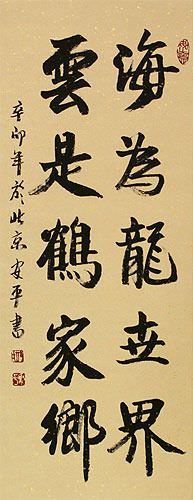 The first line (which is the column on the right) says, “The Ocean is the World of the Dragon.” The next column says, “The Clouds are the Domain of the Cranes.”
The first line (which is the column on the right) says, “The Ocean is the World of the Dragon.” The next column says, “The Clouds are the Domain of the Cranes.”
The image to the right is what this calligraphy can look like in xing-kaishu style by a Master Calligrapher.
Home is where the heart is
家とは心がある場所だ is, “Home is where the heart is,” in Japanese.
Most Japanese will take this to mean:
If you are with the person or at the place you love most, it becomes your true home.
Note: Because this selection contains some special Japanese Hiragana characters, it should be written by a Japanese calligrapher.
No Place Like Home
在家千日好出门一时难 is a Chinese proverb that literally means “At home, one can spend a thousand days in comfort but spending a day away from home can be challenging.”
Figuratively, this means “There's no place like home,” or roughly a Chinese version of “Home sweet home.”
Joshua 24:15
This House Serves the LORD
私と私の家とは、主に仕える is the last bit of Joshua 24:15 in Japanese.
Joshua 24:15 (KJV) ...as for me and my house, we will serve the LORD.
Joshua 24:15 (NIV) ...as for me and my household, we will serve the LORD.
This came from the Shinkaiyaku Japanese Bible. This is the most commonly-used Bible translation in Japan for both Protestants and Catholic Japanese folks.
I think it is a bit like having a secret code on your wall that quietly expresses to whom you are faithful.
This will be a nice gift for a friend or a wonderful expression of faith for your own home.
Note: Because this selection contains some special Japanese Hiragana characters, it should be written by a Japanese calligrapher.
Any success can not compensate for failure in the home
Joshua 24:15
This House Serves the LORD
至於我和我家我們必定事奉耶和華 is the last sentence of Joshua 24:15 in Chinese.

What your
calligraphy
might look like
from our
Chinese Master
Calligrapher
Joshua 24:15 (KJV) ...as for me and my house, we will serve the LORD.
Joshua 24:15 (NIV) ...as for me and my household, we will serve the LORD.
We used the only official Christian Chinese Bible that I know of so that the translation would be as accurate and standard as possible. Any Chinese Christian worth their salt will easily be able to identify this verse from the Chinese words on this scroll.
I think it is a bit like having a secret code on your wall that quietly expresses to whom you are faithful.
A great gift for your devout Christian or Jewish friend if they happen to be fond of Asian art.
Or perhaps a wonderful “conversation starter” for your own home.
Note: If you are curious, the last three characters represent the way “LORD” is used in most English Bibles. In Chinese, this is actually the phonetic name from Mandarin Chinese for “Jehovah.”
Five Codes of Tang Soo Do
国家忠诚父母孝道朋友有信杀生有择临战无退 are the five codes of Tang Soo Do.
I suggest you have this arranged in five columns when you get to the options page for your custom calligraphy wall scroll.
Here are my translations of each of the five codes:
國家忠誠 Be loyal to your country.
父母孝道 In regards to parents, behave in a filial way.
朋友有信 Be faithful in friendship.
殺生有擇 When fighting for life and death, make noble choices.
臨戰無退 No retreat in battle.
Note: “Tang Soo Do” is a romanization of 唐手道. It's 당수도 in Korean Hangul. It can also be romanized as “Tangsudo” or “Dangsudo.”
Mountain Travels Poem by Dumu
This poem was written almost 1200 years ago during the Tang dynasty.
It depicts traveling up a place known as Cold Mountain, where some hearty people have built their homes. The traveler is overwhelmed by the beauty of the turning leaves of the maple forest that surrounds him just as night overtakes the day, and darkness prevails. His heart implores him to stop, and take in all of the beauty around him.
First, before you get to the full translation, I must tell you that Chinese poetry is a lot different than what we have in the west. Chinese words simply don't rhyme in the same way that English or other western languages do. Chinese poetry depends on rhythm and a certain beat of repeated numbers of characters.
I have done my best to translate this poem keeping a certain feel of the original poet. But some of the original beauty of the poem in its original Chinese will be lost in translation.
Far away on Cold Mountain, a stone path leads upwards.
Among white clouds, people's homes reside.
Stopping my carriage I must, as to admire the maple forest at nights fall.
In awe of autumn leaves showing more red than even flowers of early spring.
Hopefully, this poem will remind you to stop, and “take it all in” as you travel through life.
The poet's name is “Du Mu” in Chinese that is: ![]()
![]() .
.
The title of the poem, “Mountain Travels” is: ![]()
![]()
You can have the title, poet's name, and even “Tang Dynasty” written as an inscription on your custom wall scroll if you like.
More about the poet:
Dumu lived from 803-852 AD and was a leading Chinese poet during the later part of the Tang dynasty.
He was born in Chang'an, a city in central China and the former capital of the ancient Chinese empire in 221-206 BC. In present-day China, his birthplace is currently known as Xi'an, the home of the Terracotta Soldiers.
He was awarded his Jinshi degree (an exam administered by the emperor's court which leads to becoming an official of the court) at the age of 25 and went on to hold many official positions over the years. However, he never achieved a high rank, apparently because of some disputes between various factions, and his family's criticism of the government. His last post in the court was his appointment to the office of Secretariat Drafter.
During his life, he wrote scores of narrative poems, as well as a commentary on the Art of War and many letters of advice to high officials.
His poems were often very realistic and often depicted everyday life. He wrote poems about everything, from drinking beer in a tavern to weepy poems about lost love.
The thing that strikes you most is the fact even after 1200 years, not much has changed about the beauty of nature, toils, and troubles of love and beer drinking.
Tom Clan Generational Poem
爾昌友延嗣捷開文裔光宗傳世澤遠晉本立道隆積善家國重學業廣成芳 is the Tom Clan Generational Poem.
If you are interested in this poem, you probably already know the meaning, so for now we'll forgo including a translation.
Daodejing / Tao Te Ching - Chapter 54
This is the Mawangdui version of Daodejing chapter 54.
By its virtue alone can one generation after another carry on the ancestral sacrifice.
Apply it to yourself, and by its power, you will be freed from dross.
Apply it to your household, and your household shall thereby have abundance.
Apply it to the village, and the village will be made secure.
Apply it to the kingdom, and the kingdom shall thereby be made to flourish.
Apply it to an empire, and the empire shall thereby be extended.
Therefore just as through oneself, one may contemplate Oneself;
So through the household one may contemplate the Household;
And through the village, one may contemplate the Village;
And through the kingdom, one may contemplate the Kingdom;
And through the empire, one may contemplate the Empire.
How do I know that the empire is so? By this.
What is firmly rooted cannot be pulled out;
What is tightly held in the arms will not slip loose;
Through this, the offering of sacrifice by descendants will never come to an end.
Cultivate it in your person, and its virtue will be genuine;
Cultivate it in the family, and its virtue will be more than sufficient;
Cultivate it in the hamlet, and its virtue will endure;
Cultivate it in the state, and its virtue will abound;
Cultivate it in the empire, and its virtue will be pervasive.
Hence look at the person through the person;
Look at the family through the family;
Look at the hamlet through the hamlet;
Look at the state through the state;
Look at the empire through the empire.
How do I know that the empire is like that?
By means of this.
Not the results for 家 that you were looking for?
Below are some entries from our dictionary that may match your 家 search...
| Characters If shown, 2nd row is Simp. Chinese |
Pronunciation Romanization |
Simple Dictionary Definition |
家 see styles |
jiā jia1 chia chi ち |
More info & calligraphy: Family / Home(suffix) (colloquialism) (kana only) (See ん家) 's house; 's home; (surname) Karyū Family; home; school, sect; genus. |
宗家 see styles |
zōng jiā zong1 jia1 tsung chia souke(p); souka / soke(p); soka そうけ(P); そうか |
More info & calligraphy: Soke / ShukeA name for Shandao 善導 (d. 681), a writer of commentaries on the sutras of the Pure Land sect, and one of its principal literary men; cf. 念佛宗. |
家庭 see styles |
jiā tíng jia1 ting2 chia t`ing chia ting katei / kate かてい |
More info & calligraphy: Family / Householdhome; household; family; hearth household |
家族 see styles |
jiā zú jia1 zu2 chia tsu kazoku かぞく |
More info & calligraphy: Family / Members of a Familyfamily |
洪家 see styles |
hóng jiā hong2 jia1 hung chia |
More info & calligraphy: Hung Gar |
貴家 see styles |
kika きか |
More info & calligraphy: Sasuga / Takaya |
内家拳 see styles |
naikaken ないかけん |
More info & calligraphy: Neijia Fist |
夢想家 梦想家 see styles |
mèng xiǎng jiā meng4 xiang3 jia1 meng hsiang chia musouka / musoka むそうか |
More info & calligraphy: Dreamerdreamer |
家族愛 see styles |
kazokuai かぞくあい |
More info & calligraphy: Family Love |
平家星 see styles |
heikeboshi / hekeboshi へいけぼし |
More info & calligraphy: Heike Star / Betelgeuse |
建築家 see styles |
kenchikuka けんちくか |
More info & calligraphy: Architect |
武道家 see styles |
budouka / budoka ぶどうか |
More info & calligraphy: Budoka |
空想家 see styles |
kōng xiǎng jiā kong1 xiang3 jia1 k`ung hsiang chia kung hsiang chia kuusouka / kusoka くうそうか |
More info & calligraphy: Visionary / Dreamerdreamer; daydreamer; visionary |
空手家 see styles |
karateka からてか |
More info & calligraphy: Karateka |
舞蹈家 see styles |
wǔ dǎo jiā wu3 dao3 jia1 wu tao chia |
More info & calligraphy: Dancer |
運動家 运动家 see styles |
yùn dòng jiā yun4 dong4 jia1 yün tung chia undouka / undoka うんどうか |
More info & calligraphy: Athlete(1) (See 活動家) activist; campaigner; crusader (e.g. for women's rights); (2) athlete; sporty person |
音樂家 音乐家 see styles |
yīn yuè jiā yin1 yue4 jia1 yin yüeh chia |
More info & calligraphy: Musician |
勤儉起家 勤俭起家 see styles |
qín jiǎn qǐ jiā qin2 jian3 qi3 jia1 ch`in chien ch`i chia chin chien chi chia |
More info & calligraphy: Rise Up with Thrift and Diligence |
四海為家 四海为家 see styles |
sì hǎi wéi jiā si4 hai3 wei2 jia1 ssu hai wei chia |
More info & calligraphy: Feel at Ease Anywhere / The World is My Home |
家内安全 see styles |
kanaianzen かないあんぜん |
More info & calligraphy: Safety and Well-Being of the Family |
傢 家 see styles |
jiā jia1 chia |
used in 傢伙|家伙[jia1 huo5] and 傢俱|家俱[jia1 ju4] See: 家 |
お家 see styles |
ouchi / ochi おうち |
(polite language) (kana only) home; your home; your group; their home |
ん家 see styles |
nchi んち |
(suf,exp) (kana only) (abbreviation) 's house; 's home |
一家 see styles |
yī jiā yi1 jia1 i chia ikka(p); ikke いっか(P); いっけ |
the whole family; the same family; the family ... (when preceded by a family name); group (1) a family; a household; a home; one's family; whole family; (2) (one's own) style; school; (3) gang; (yakuza) family; (surname) Hitotsuya one school |
七家 see styles |
nanaie なないえ |
(surname) Nanaie |
万家 see styles |
manie まんいえ |
(surname) Man'ie |
三家 see styles |
sanke さんけ |
(1) (hist) three noble families (Kan'in, Kazan'in and Nakanoin or Koga); (2) (hist) (See 御三家・1) three branches of the Tokugawa family (Owari, Kii and Mito); (surname) Miya |
上家 see styles |
shàng jiā shang4 jia1 shang chia kamicha; kamicha かみチャ; カミチャ |
preceding player (in a game) {mahj} (See 下家・しもチャ,対面・トイメン・1) left-hand opponent (chi: shàngjiā); player to one's left; (surname) Jōya |
下家 see styles |
xià jiā xia4 jia1 hsia chia shimocha; shimocha しもチャ; シモチャ |
player whose turn comes next (in a game); next one; my humble home {mahj} (See 上家・かみチャ,対面・トイメン・1) right-hand opponent (chi: xiàjiā); player to one's right; (surname) Shimoya |
世家 see styles |
shì jiā shi4 jia1 shih chia seke |
family influential for generations; aristocratic family generational houses |
Click here for more 家 results from our dictionary
The following table may be helpful for those studying Chinese or Japanese...
| Title | Characters | Romaji (Romanized Japanese) | Various forms of Romanized Chinese | |
| Family Members of a Family | 家族 | ka zoku / kazoku | jiā zú / jia1 zu2 / jia zu / jiazu | chia tsu / chiatsu |
| Family Home | 家 / 傢 家 | ei / uchi / ke | jiā / jia1 / jia | chia |
| Hung Gar | 洪家 | hóng jiā / hong2 jia1 / hong jia / hongjia | hung chia / hungchia | |
| Sasuga Takaya | 貴家 | takaya / takatsuka / sasuga / kiya / kika | ||
| Soke Shuke | 宗家 | Shuuke / Shuke | zōng jiā / zong1 jia1 / zong jia / zongjia | tsung chia / tsungchia |
| Architect | 建築家 | kenchikka / kenchika | ||
| Athlete | 運動家 运动家 | undouka / undoka | yùn dòng jiā yun4 dong4 jia1 yun dong jia yundongjia | yün tung chia yüntungchia |
| Budoka | 武道家 | bu dou ka / budouka / bu do ka | ||
| Dancer | 舞蹈家 | wǔ dǎo jiā wu3 dao3 jia1 wu dao jia wudaojia | wu tao chia wutaochia |
|
| Dreamer | 夢想家 梦想家 | mu sou ka / musouka / mu so ka | mèng xiǎng jiā meng4 xiang3 jia1 meng xiang jia mengxiangjia | meng hsiang chia menghsiangchia |
| Family Love | 家族愛 | kazokuai / kazokuai | ||
| Heike Star Betelgeuse | 平家星 | hei ke boshi heikeboshi | ||
| Home of the Dragon | 龍之家 龙之家 | lóng zhī jiā long2 zhi1 jia1 long zhi jia longzhijia | lung chih chia lungchihchia |
|
| Hung Ga Kuen | 洪家拳 | hóng jiā quán hong2 jia1 quan2 hong jia quan hongjiaquan | hung chia ch`üan hungchiachüan hung chia chüan |
|
| Karateka | 空手家 | karateka | ||
| Neijia Fist | 内家拳 | naikaken | nèi jiā quán nei4 jia1 quan2 nei jia quan neijiaquan | nei chia ch`üan neichiachüan nei chia chüan |
| Visionary Dreamer | 空想家 | kuusouka / kusoka | ||
| Family Household | 家庭 / 傢庭 家庭 | ka tei / katei | jiā tíng / jia1 ting2 / jia ting / jiating | chia t`ing / chiating / chia ting |
| Family Over Everything | 家庭至上 | jiā tíng zhì shàng jia1 ting2 zhi4 shang4 jia ting zhi shang jiatingzhishang | chia t`ing chih shang chiatingchihshang chia ting chih shang |
|
| Forever Family | 永遠的家 永远的家 | yǒng yuǎn de jiā yong3 yuan3 de jia1 yong yuan de jia yongyuandejia | yung yüan te chia yungyüantechia |
|
| Happy Family | 和諧之家 和谐之家 | hé xié zhī jiā he2 xie2 zhi1 jia1 he xie zhi jia hexiezhijia | ho hsieh chih chia hohsiehchihchia |
|
| Feel at Ease Anywhere The World is My Home | 四海為家 四海为家 | sì hǎi wéi jiā si4 hai3 wei2 jia1 si hai wei jia sihaiweijia | ssu hai wei chia ssuhaiweichia |
|
| Home of the Black Dragon | 黑龍之家 黑龙之家 | hēi lóng zhī jiā hei1 long2 zhi1 jia1 hei long zhi jia heilongzhijia | hei lung chih chia heilungchihchia |
|
| Home is where the heart is | 家由心生 | jiā yóu xīn shēng jia1 you2 xin1 sheng1 jia you xin sheng jiayouxinsheng | chia yu hsin sheng chiayuhsinsheng |
|
| Safety and Well-Being of the Family | 家內安全 家内安全 | ka nai an zen kanaianzen | ||
| Lau Gar Kung Fu | 劉家功夫 刘家功夫 | liú jiā gōng fu liu2 jia1 gong1 fu liu jia gong fu liujiagongfu | liu chia kung fu liuchiakungfu |
|
| One Family Under Heaven | 天下一家 | tenka ikka / tenkaikka / tenka ika | tiān xià yī jiā tian1 xia4 yi1 jia1 tian xia yi jia tianxiayijia | t`ien hsia i chia tienhsiaichia tien hsia i chia |
| Rise Up with Thrift and Diligence | 勤儉起家 勤俭起家 | qín jiǎn qǐ jiā qin2 jian3 qi3 jia1 qin jian qi jia qinjianqijia | ch`in chien ch`i chia chinchienchichia chin chien chi chia |
|
| Family and Friends | 家族や友人 | kazoku ya yuujin kazokuyayuujin kazoku ya yujin | ||
| Musician | 音樂家 音乐家 / 音楽家 | ongakuka | yīn yuè jiā yin1 yue4 jia1 yin yue jia yinyuejia | yin yüeh chia yinyüehchia |
| Happy Family | 和やかな家庭 | nago ya ka na ka tei nagoyakanakatei | ||
| Home of the Auspicious Golden Dragon | 金瑞祥龍之家 金瑞祥龙之家 | jīn ruì xiáng lóng zhī jiā jin1 rui4 xiang2 long2 zhi1 jia1 jin rui xiang long zhi jia jinruixianglongzhijia | chin jui hsiang lung chih chia | |
| Bless this House | この家に祝福を | kono-ka ni shukufuku o kono-kanishukufukuo | ||
| The farts of others stink, but one’s own smells sweet | 別人屁臭自家香 别人屁臭自家香 | bié rén pì chòu zì jiā xiāng bie2 ren2 pi4 chou4 zi4 jia1 xiang1 bie ren pi chou zi jia xiang bierenpichouzijiaxiang | pieh jen p`i ch`ou tzu chia hsiang pieh jen pi chou tzu chia hsiang |
|
| Every Creature Has A Domain | 海為龍世界雲是鶴家鄉 海为龙世界云是鹤家乡 | hǎi wéi lóng shì jiè yún shì hè jiā xiāng hai3 wei2 long2 shi4 jie4 yun2 shi4 he4 jia1 xiang1 hai wei long shi jie yun shi he jia xiang | hai wei lung shih chieh yün shih ho chia hsiang | |
| Home is where the heart is | 家とは心がある場所だ | ie to wa kokoro ga aru basho da ietowakokorogaarubashoda | ||
| No Place Like Home | 在家千日好出門一時難 在家千日好出门一时难 | zài jiā qiān rì hǎo chū mén yì shí nán zai4 jia1 qian1 ri4 hao3 chu1 men2 yi4 shi2 nan2 zai jia qian ri hao chu men yi shi nan | tsai chia ch`ien jih hao ch`u men i shih nan tsai chia chien jih hao chu men i shih nan |
|
| Joshua 24:15 | 私と私の家とは主に仕える | Watashi to watashinoie to wa omo ni tsukaeru | ||
| Any success can not compensate for failure in the home | 所有的成功都無法補償家庭的失敗 所有的成功都无法补偿家庭的失败 | suǒ yǒu de chéng gōng dōu wú fǎ bǔ cháng jiā tíng de shī bài suo3 you3 de cheng2 gong1 dou1 wu2 fa3 bu3 chang2 jia1 ting2 de shi1 bai4 suo you de cheng gong dou wu fa bu chang jia ting de shi bai | so yu te ch`eng kung tou wu fa pu ch`ang chia t`ing te shih pai so yu te cheng kung tou wu fa pu chang chia ting te shih pai |
|
| Joshua 24:15 | 至於我和我家我們必定事奉耶和華 至于我和我家我们必定事奉耶和华 | zhì yú wǒ hé wǒ jiā wǒ men bì dìng shì fèng yē hé huá zhi4 yu2 wo3 he2 wo3 jia1 wo3 men bi4 ding4 shi4 feng4 ye1 he2 hua2 zhi yu wo he wo jia wo men bi ding shi feng ye he hua | chih yü wo ho wo chia wo men pi ting shih feng yeh ho hua | |
| Five Codes of Tang Soo Do | 國家忠誠父母孝道朋友有信殺生有擇臨戰無退 国家忠诚父母孝道朋友有信杀生有择临战无退 | guó jiā zhōng chéng fù mǔ xiào dào péng yǒu yǒu xìn shā shēng yǒu zé lín zhàn wú tuì guo2 jia1 zhong1 cheng2 fu4 mu3 xiao4 dao4 peng2 you3 you3 xin4 sha1 sheng1 you3 ze2 lin2 zhan4 wu2 tui4 guo jia zhong cheng fu mu xiao dao peng you you xin sha sheng you ze lin zhan wu tui | kuo chia chung ch`eng fu mu hsiao tao p`eng yu yu hsin sha sheng yu tse lin chan wu t`ui kuo chia chung cheng fu mu hsiao tao peng yu yu hsin sha sheng yu tse lin chan wu tui |
|
| Mountain Travels Poem by Dumu | 遠上寒山石徑斜白雲生處有人家停車坐愛楓林晚霜葉紅於二月花 远上寒山石径斜白云生处有人家停车坐爱枫林晚霜叶红于二月花 | yuǎn shàng hán shān shí jìng xiá bái yún shēng chù yǒu rén jiā tíng chē zuò ài fēng lín wǎn shuàng yè hóng yú èr yuè huā yuan3 shang4 han2 shan1 shi2 jing4 xia2 bai2 yun2 sheng1 chu4 you3 ren2 jia1 ting2 che1 zuo4 ai4 feng1 lin2 wan3 shuang4 ye4 hong2 yu2 er4 yue4 hua1 yuan shang han shan shi jing xia bai yun sheng chu you ren jia ting che zuo ai feng lin wan shuang ye hong yu er yue hua | yüan shang han shan shih ching hsia pai yün sheng ch`u yu jen chia t`ing ch`e tso ai feng lin wan shuang yeh hung yü erh yüeh hua yüan shang han shan shih ching hsia pai yün sheng chu yu jen chia ting che tso ai feng lin wan shuang yeh hung yü erh yüeh hua |
|
| Tom Clan Generational Poem | 爾昌友延嗣捷開文裔光宗傳世澤遠晉本立道隆積善家國重學業廣成芳 尔昌友延嗣捷开文裔光宗传世泽远晋本立道隆积善家国重学业广成芳 | ěr chāng yǒu yán sì jié kāi wén yì guāng zōng chuán shì zé yuǎn jìn běn lì dào lóng jī shàn jiā guó zhòng xué yè guǎng chéng fāng er3 chang1 you3 yan2 si4 jie2 kai1 wen2 yi4 guang1 zong1 chuan2 shi4 ze2 yuan3 jin4 ben3 li4 dao4 long2 ji1 shan4 jia1 guo2 zhong4 xue2 ye4 guang3 cheng2 fang1 er chang you yan si jie kai wen yi guang zong chuan shi ze yuan jin ben li dao long ji shan jia guo zhong xue ye guang cheng fang | erh ch`ang yu yen ssu chieh k`ai wen i kuang tsung ch`uan shih tse yüan chin pen li tao lung chi shan chia kuo chung hsüeh yeh kuang ch`eng fang erh chang yu yen ssu chieh kai wen i kuang tsung chuan shih tse yüan chin pen li tao lung chi shan chia kuo chung hsüeh yeh kuang cheng fang |
|
| Daodejing Tao Te Ching - Chapter 54 | 善建者不拔善抱者不脫子孫以祭祀不絕修之身其德乃真修之家其德有余修之鄉其德乃長修之國其德乃夆修之於天下其德乃博以身觀身以家觀家以鄉觀鄉以邦觀邦以天下觀天下吾何以知天下然茲以此 善建者不拔善抱者不脱子孙以祭祀不绝修之身其德乃真修之家其德有余修之乡其德乃长修之国其德乃夆修之于天下其德乃博以身观身以家观家以乡观乡以邦观邦以天下观天下吾何以知天下然兹以此 | shàn jiàn zhě bù bá shàn bào zhě bù tuō zǐ sūn yǐ jì sì bù jué xiū zhī shēn qí dé nǎi zhēn xiū zhī jiā qí dé yǒu yú xiū zhī xiāng qí dé nǎi zhǎng xiū zhī guó qí dé nǎi féng xiū zhī yú tiān xià qí dé nǎi bó yǐ shēn guān shēn yǐ jiā guān jiā yǐ xiāng guān xiāng yǐ bāng guān bāng yǐ tiān xià guān tiān xià wú hé yǐ zhī tiān xià rán zī yǐ cǐ shan4 jian4 zhe3 bu4 ba2 shan4 bao4 zhe3 bu4 tuo1 zi3 sun1 yi3 ji4 si4 bu4 jue2 xiu1 zhi1 shen1 qi2 de2 nai3 zhen1 xiu1 zhi1 jia1 qi2 de2 you3 yu2 xiu1 zhi1 xiang1 qi2 de2 nai3 zhang3 xiu1 zhi1 guo2 qi2 de2 nai3 feng2 xiu1 zhi1 yu2 tian1 xia4 qi2 de2 nai3 bo2 yi3 shen1 guan1 shen1 yi3 jia1 guan1 jia1 yi3 xiang1 guan1 xiang1 yi3 bang1 guan1 bang1 yi3 tian1 xia4 guan1 tian1 xia4 wu2 he2 yi3 zhi1 tian1 xia4 ran2 zi1 yi3 ci3 shan jian zhe bu ba shan bao zhe bu tuo zi sun yi ji si bu jue xiu zhi shen qi de nai zhen xiu zhi jia qi de you yu xiu zhi xiang qi de nai zhang xiu zhi guo qi de nai feng xiu zhi yu tian xia qi de nai bo yi shen guan shen yi jia guan jia yi xiang guan xiang yi bang guan bang yi tian xia guan tian xia wu he yi zhi tian xia ran zi yi ci | shan chien che pu pa shan pao che pu t`o tzu sun i chi ssu pu chüeh hsiu chih shen ch`i te nai chen hsiu chih chia ch`i te yu yü hsiu chih hsiang ch`i te nai chang hsiu chih kuo ch`i te nai feng hsiu chih yü t`ien hsia ch`i te nai po i shen kuan shen i chia kuan chia i hsiang kuan hsiang i pang kuan pang i t`ien hsia kuan t`ien hsia wu ho i chih t`ien hsia jan tzu i tz`u shan chien che pu pa shan pao che pu to tzu sun i chi ssu pu chüeh hsiu chih shen chi te nai chen hsiu chih chia chi te yu yü hsiu chih hsiang chi te nai chang hsiu chih kuo chi te nai feng hsiu chih yü tien hsia chi te nai po i shen kuan shen i chia kuan chia i hsiang kuan hsiang i pang kuan pang i tien hsia kuan tien hsia wu ho i chih tien hsia jan tzu i tzu |
|
| In some entries above you will see that characters have different versions above and below a line. In these cases, the characters above the line are Traditional Chinese, while the ones below are Simplified Chinese. | ||||
Successful Chinese Character and Japanese Kanji calligraphy searches within the last few hours...
